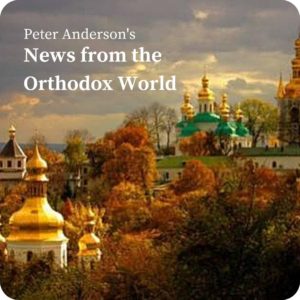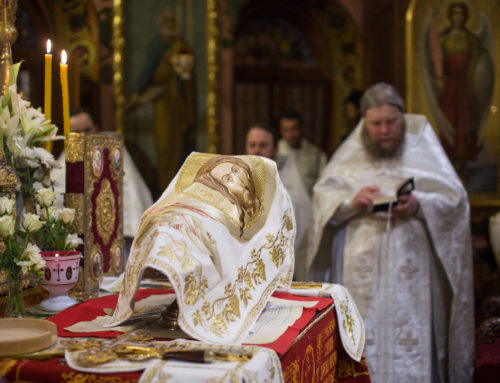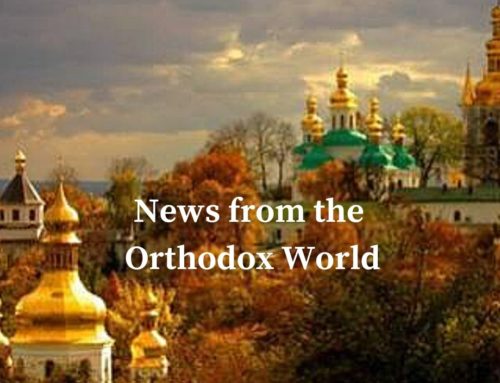Peter Anderson reports from the Orthodox world.
Longstanding reporter of the news from the Eastern Church, Peter Anderson shares our dream of a unified Christianity. His love for Orthodoxy has driven him to this personal mission to share the news of East with the world through his email list. The Urbi et Orbi Foundation is proud to share his efforts and his insights with you.

On Wednesday, April 28, Bishop Irinej of Bačka (Serbian Patriarchate) gave an important interview to the major Serbian newspaper Politika. On May 1, the day before Pascha, the entire interview was posted on the website of the Serbian Patriarchate. www.spc.rs/sr/episkop_bachki_irinej_intervju_dat_politici On May 5, the entire interview, translated into Russian, was posted on the website of the Moscow Patriarchate’s DECR. https://mospat.ru/ru/news/87168/ It is not surprising that the DECR has posted the interview as it is very supportive of Moscow’s position in its current disputes with Constantinople. In translating the interview into English, the Google translation tool works much better on the Russian version than on the original Serbian version. The interview covers such subjects as the authority of the Ecumenical Patriarch, the situation involving North Macedonia, and proposed legislation involving the control exercised by the Serbian Church over the Theology Faculty at the state-operated University of Belgrade. Because of its importance, the interview should be read in its entirety. However, in my report, I will focus on the Bishop’s remarks relating to the authority of the Ecumenical Patriarch and primacy. The Google translation of the Russian is as follows:
– During these days, one could hear the statements of the Russian Orthodox Church, as well as the Jerusalem Patriarchate, that the possibility of holding a new meeting of representatives of Local Orthodox Churches, similar to the one that took place in Amman (in which the Serbian Church also participated), is being considered. Moscow also voiced the opinion that there is no longer a need to preserve the practice of convening such meetings by the Ecumenical Patriarch, since he lost the status of the first among equals because of his support for Ukrainian schismatics. How do you assess these appeals, as well as the remarks regarding the Ecumenical Patriarch?
– Negotiations on overcoming this problem are needed. They should be held in different formats, bilateral and multilateral, and the most expedient and most fruitful would be a conciliar, pan-Orthodox one. However, the Patriarch of Constantinople refuses so far to convene a Pan-Orthodox Council, because, according to his interpretation, he, in one way or another, as the first among equals bishop of the Orthodox Church, has the right to act independently and arbitrarily on matters of jurisdiction and autocephaly of Local Churches, regardless of their opinion, even if it coincides with the majority opinion or is universal. Sound familiar, doesn’t it? Unfortunately, such rhetoric from the shores of the Bosporus is too similar to rhetoric from the banks of the Tiber in Italy. “New Rome”, Constantinople, Tsarigrad, today Istanbul seems to want to become an exact copy of “old Rome” in the ecclesiastical sense.
Moreover, some theologians of Constantinople defend the thesis that no one except the Ecumenical Patriarch has the right to convene pan-Orthodox or inter-Orthodox councils. This thesis, of course, has no basis either in theology or in the history of the Church. Most of the Ecumenical Councils of the past were not convened by the Patriarch of Constantinople, and it is a fact that at the Ecumenical Councils some popes and some Patriarchs of Constantinople were tried for heresy or sins of faith. If the Church of Constantinople really had ecumenical or universal jurisdiction and a monopoly on the convocation of Local and Ecumenical Councils, there would never have been a single council at which the Pope or the Patriarch of Constantinople would sit in the dock, and not for a disciplinary offense or a crime against morality, but for the most serious dogmatic violation, for apostasy from the true faith. Thus, the Patriarch of Jerusalem, with his authority as the Bishop of the Holy City of Jerusalem and the authority of his Church as the oldest Apostolic Church that protects the greatest shrines of the Holy Land, has the opportunity and the right to convene other Patriarchs and other Primates of Churches to overcome emerging problems and preserve the unity of the Church, if already the first among equals, the Patriarch does not want to convene them.
Here the question arises: what is the nature of the primacy of the first bishop in rank? Is this the primacy of power or the primacy of honor? Is the Ecumenical Patriarch the first ex sese (by himself), de jure divino (by divine right), or by the will of the Church, based on historical rather than strictly theological factors? Is he above the Council of Bishops, or is he chairman of the Council and, therefore, a member of it? The Orthodox Church has only one answer to all these questions, clear and unambiguous: there is no primacy of power in the Church; the bishop is first in honor became such is the will of the Church, conditioned by historical reasons, and he, after all, is no higher than the Council. In short, he is primus inter pares ( first among equals ), but by no means primus sine paribus (first without equal), as the new neo-papist theory of some theologians states. Despite all that has been said, the Archbishop of Constantinople, New Rome and Ecumenical Patriarch, as his full official title sounds, has not lost the status of the first among equals, that is, the primacy of honor. Moreover, he cannot lose it, except at some new ecumenical council, if, of course, such a council suddenly made such a decision. Because he received such primacy by the decision of the Second Ecumenical Council held in 381 in Constantinople, the third canon of which reads: “The bishop of Constantinople has the privilege of honor after the Roman bishop, because this city is the new Rome.” This rule was confirmed and supported by the 28th canon of the Fourth Ecumenical Council, held in 451 in Chalcedon near Constantinople, which reads: “…we also define and set the privileges of the Holy Church of Constantinople, the new Rome (…), rightly judging that the city, which received the honor of being the city of the Emperor and Senate and having equal privileges with the old imperial Rome, and will so in the churches, and will be second to her.”
Exactly so – on the basis of state and political reality (New Rome, the city of the emperor and the Senate), and not on the basis of a dogmatic, ecclesiological imperative, as our new followers of the official Roman Catholic concept of primacy argue – a small diocese centered in the town of Byzantium, the Suffragan diocese of the Metropolis of Heraclius, at the highest level, the rank of the primordial Church of the East was acquired, so that the primacy of Rome was extended to New Rome. In the state-legal theory and ideology of the Roman Empire, both cities were actually considered as two parts of a single capital. Interpreting the meaning of superiority (primacy) in the Church, the reposed Bishop Athanasius (Evtich) wrote that primacy in the Church undoubtedly exists and should exist, but it should never violate the catholic fullness of every Orthodox Church. Consequently, primacy does not mean power over the Churches, but is an important element of their conciliar nature. I tried – I don’t know how successfully – to convey to the readers of the Politika newspaper in the simplest and most understandable way at least some important doctrinal aspects of our faith “in the One Holy, Catholic and Apostolic Church” – a faith that we ourselves seem to betray, when through the fog of vanity, ambition, prejudice, geopolitical (non-church) engagement and other immaterial idols, we cannot or do not want to see the unfading light of divine truth, which alone can free us from our tragic delusions and passions.
Let’s summarize the answer to the second part of your question. The lower authority cannot challenge, let alone overturn, the decisions of the higher authority. She in the Church is the Ecumenical Council, or, more precisely, she herself through her universal council. Thus, the Ecumenical Patriarch — despite his failure in the non-canonical intervention in the canonical territory of the Moscow Patriarchate, which widened and deepened the schism in Ukraine, extending it to almost all of Orthodoxy — did not lose his true primacy of honor, recognized by all Orthodox Churches, and those competencies, which canonically flow from him, however, unfortunately, for many in Orthodoxy, to a greater or lesser extent, he jeopardized the reputation and trust that he enjoyed until recently, both in relationships to his position and in terms of personal relationships. Both (and reputation and trust), in my deepest conviction, he can restore in the blink of an eye – and not only restore, but also unimaginably increase – if he publicly declares that he has become a victim of disinformation by Ukrainian schismatics and manipulations by the Ukrainian authorities, will revoke the recognition of the so-called Orthodox Church of Ukraine, restoring the unity of Orthodoxy and encouraging dialogue with all. Such a gesture of his would show everyone in the world what the content of primacy is in accordance with the Orthodox understanding: it is an uncompromising service to the unity of the Church, where the primate Church plays the role of inspirer, mediator and coordinator, and not the sole steward.
The Lord Christ teaches us Himself and by His words that those who voluntarily and out of love are the last, become the first before God, and those who at any cost want to become the first, inevitably become the last before God and before the people. Being for many years one of the humble collaborators of His All-Holiness Patriarch Bartholomew in the field of inter-Orthodox and pan-Orthodox affairs (among other things, in overcoming the schism in the Bulgarian Orthodox Church at the Great Council in Sofia, presiding over which, he performed a great historical work on the healing of spiritual wounds and reconciliation between brothers), I dare to conclude these reflections – perhaps immodestly, but in any case sincerely, with love and respect for his person and service – with an appeal to God and an appeal to him, the Ecumenical Patriarch, to be at the height of his vocation and his duties, to make a choice worthy of his saints and great predecessors, to remove all the rocks of temptation and every stumbling block, to erase every tear and suffering caused by the pain of the split, caused by the schismatic violence in Ukraine and not only in Ukraine. If he wants, he can do it. This can be, be! God grant that it be so!
In reading this answer, I particularly noticed the language in the third paragraph: “there is no primacy of power in the Church; the bishop is first in honor became such is the will of the Church, conditioned by historical reasons….” Although it is not totally clear, this broad statement would seem to say that there is no primacy of authority at any level in the Church. On the other hand, the statement adopted by the Holy Synod of the Russian Orthodox Church relating to primacy treats primacy differently at the diocesan, Local Church, and Universal Church levels. https://mospat.ru/en/news/51892/ The Bishop’s answer also raises the question of whether his analysis is consistent with the document on conciliarity and authority adopted at Ravenna in 2007 by the Joint International Commission for Theological Dialogue between the Orthodox and Catholic Churches. A delegation of the Serbian Patriarchate was involved in adopting this document. Only Russia and Bulgaria were absent. https://www.ecupatria.org/documents/joint-international-commission-for-the-theological-dialogue-between-the-orthodox-church-and-the-roman-catholique-church/
In the interview, Bishop Irinej does not assert that his views are those of the Serbian Orthodox Church. The Serbian Church has issued a statement rejecting the OCU (www.spc.rs/eng/position_serbian_orthodox_church_church_crisis_ukraine_after_newest_decisions_patriarchate_constanti), but this statement did not discuss the issue of primacy of the Ecumenical Patriarch generally. It should also be noted that Bishop Irinej is a very close friend of Metropolitan Hilarion (head of the DECR of the Moscow Patriarchate). The support of Bishop Irinej is therefore not surprising. On the other hand, one must remember that Bishop Irinej is the “spiritual father” of Patriarch Porfirije of Serbia, has often served as the spokesperson of the Serbian Patriarchate, and was one of the three finalists in the recent election of a new patriarch. He is an extremely important voice in the Serbian Patriarchate. Interestingly, he is also one of two Serbian members on the Joint International Commission for Theological Dialogue between the Orthodox and Catholic Churches.
Last Sunday, the joyful liturgy of the Resurrection was celebrated by the Orthodox. However, because of the pandemic, it was without the huge crowds. Still, in Russia, the Ministry of Internal Affairs estimated that “more than 1.6 million believers” attended the liturgy on the night of May 1-2. https://tass.ru/obschestvo/11296353 The general situation and the restrictions in Russia during Pascha are described by RIA Novosti at https://ria.ru/20210502/paskha-1730907218.html . According to this article, 4.3 million believers attended the Pascha liturgy in 2019 — before the pandemic. The entire beautiful liturgy at the Christ the Savior Cathedral in Moscow, with Patriarch Kirill presiding, can be seen at https://www.youtube.com/watch?v=ta-5Pmf8MU8&t=10s. President Putin was in attendance. As a Catholic, I was pleased to see that the Apostolic Nuncio to the Russian Federation, Archbishop Giovanni d’Aniello, and Catholic Archbishop Pavel Pezzi, head of the Mother of God archdiocese in Moscow, were placed in a very prominent position to the right of the iconostasis. See 2:24:30 and 2:54:00 in the video. The apostolic nuncio to Serbia and the Catholic archbishop of Belgrade were also prominently placed at the Pascha liturgy in St. Sava Cathedral in Belgrade. See https://www.youtube.com/watch?v=0irFOpK3Q2U at 2:25.
On Pascha, Patriarch Porfirije of Serbia had his midday meal with 20 homeless people. In the afternoon, he visited with sick children. www.spc.rs/eng/patriarch_porfirije_homeless_and_sick_children; https://www.youtube.com/watch?v=SKwpn43OpMk (video) Another article also illustrates his humble approach to his new job. He often walks to work on the public street without any escort. On Good Friday, he was seen walking the 9 kilometers from his residence in the Dedinje neighborhood of Belgrade on foot alone to the Cathedral of St. Michael the Archangel in the center of Belgrade. https://www.blic.rs/vesti/drustvo/na-posao-dolazi-bez-sluzbenog-vozila-prolaznici-u-cudu-sto-su-na-mostarskoj-petlji/536lxej His humble approach reminds me somewhat of Pope Francis.
On April 22, President Putin held a meeting in Moscow with President Lukashenko of Belarus. After the meeting, President Putin answered questions from journalists. One question related to an offer by President Zelensky of Ukraine to meet with President Putin in Donbass. Putin replied that he would not meet to discuss problems relating to Donbass unless Zelensky first meets with the leaders of the DPR and LPR (the proclaimed republics in Donbass). However, Putin stated that he would be willing to meet with Zelensky in Moscow to discuss bilateral relations between Russia and Ukraine. https://en.kremlin.ru/events/president/news/65428 With respect to current problems in bilateral relations, Putin stated:
It includes their attitude towards the Russian Orthodox Church and attempts to destroy it. This applies to their attitude towards the Russian language and Russian-speaking citizens of Ukraine and Russian citizens living in Ukraine. Many steps have been taken to destroy our relations, which we can only regret.
While denying any discrimination, Zelensky stated on April 26 that he would be willing to discuss the church and language issues if a meeting was held. https://www.unian.info/politics/ukraine-russia-tension-zelensky-responds-to-putin-s-allegations-of-oppression-of-russian-speakers-11401471.html Later, Zelensky was asked by a journalist from La Repubblica whether he considered the Vatican as a venue for the meeting. Zelensky replies that “this could be the best place from all points of view.” https://www.ukrinform.net/rubric-polytics/3236602-zelensky-sees-vatican-as-best-place-to-meet-with-putin.html There has been one subsequent report that Zelensky may not longer consider the Vatican his first choice for a venue. https://risu.ua/u-zelenskogo-nazvali-novi-miscya-dlya-zustrichi-z-putinim–ce-mozhe-buti-i-yerusalim_n118171
In the competition between the UOC-MP and the OCU in Ukraine, the UOC-MP was able to receive in Kyiv the Holy Fire from Jerusalem on Saturday evening while the OCU only received the Holy Fire on Sunday morning via commercial carrier. Metropolitan Anthony of Boryspil (UOC-MP) received the Holy Fire at Ben Gurion Airport and returned to Kyiv on a charter flight. https://news.church.ua/2021/05/01/delegaciya-ukrajinskoji-pravoslavnoji-cerkvi-dostavila-blagodatnij-vogon-v-ukrajinu-2021/ A two-minute video shows the arrival of the charter flight in Kyiv. https://www.youtube.com/watch?v=5dCnVfHgkcw From the video, one sees again Vadim Novinsky, the billionaire parliamentarian who has helped the UOC-MP so much financially in recent years. From his Facebook page, it is clear that Novinsky provided the charter. https://www.facebook.com/profile.php?id=100010720391976 At the huge procession of the cross in Kyiv in July 2019, Novinsky was almost constantly at the side of Metropolitan Onufry. I suspect that he may have paid much of the cost of transporting the very large number of UOC-MP believers from all parts of Ukraine to Kyiv for the procession of the cross.
In conclusion, I greet all of you: CHRIST HAS RISEN!
Peter Anderson, Seattle USA


